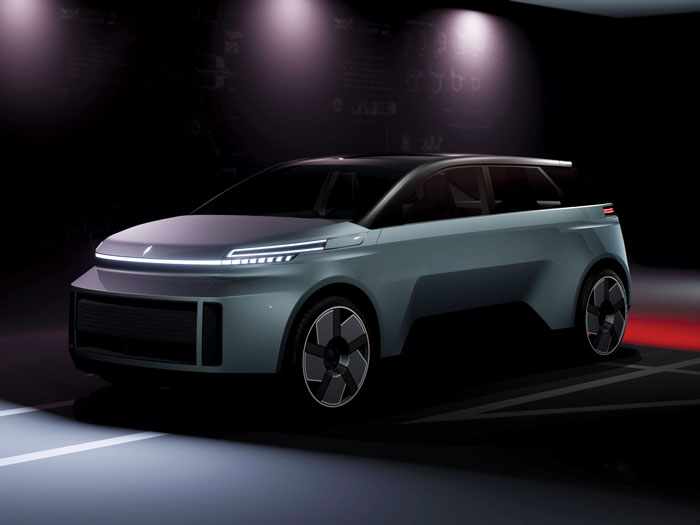 Four Carleton University students initially designed the Project Arrow as an entry in a design contest (Photo courtesy of Project Arrow)
Four Carleton University students initially designed the Project Arrow as an entry in a design contest (Photo courtesy of Project Arrow)
Before it was a sleek silver vehicle with aerodynamic curves and wraparound headlights that inspired comparisons to both Tesla and Volkswagen, Project Arrow—an all-Canadian concept vehicle that makes its debut at the 2023 Consumer Electronics Show—was an entry in a design contest.
In 2020, in response to Prime Minister Justin Trudeau’s call for a zero-emissions future by 2050, the Automotive Parts Manufacturers’ Association (APMA) called for visionary ideas from Canadian universities and colleges, and four students from Carleton University’s School of Industrial Design responded with a design for the industry’s first all-Canadian, zero-emissions vehicle, beating out entries from over 20 other groups across the country.
Kaj Hallgrimsson, Jun-Won Kim, Mina Morcos and Matthew Schuetz completed their pitch in just 12 weeks between classes and internships, and it’s impressive. The prototype is being built start to finish with Canadian design, materials, engineering and parts, and its name is a nod to another iconic Canadian invention: the Avro Arrow, the supersonic jet designed and built in Canada in the 1950s.
It’s fitting that the winning pitch came from students, because for Flavio Volpe, president of the APMA, Project Arrow is a means of throwing down the gauntlet on tackling the challenge of our times—mobility and climate change. But it also shows that Canada can lead when it comes to automotive and engineering innovation. “We want to show that the Canadian supply chain is as advanced as any in the world,” Volpe told the Financial Post in 2020.
While we likely won’t be seeing Project Arrow on the road any time soon, it’s designed with the average North American in mind and built to Canada Motor Vehicle Safety Standards, just in case. Its main focus though? To show what Canada’s auto sector can do, and that money invested in Canadian automotive engineering is money well spent.
“Electric vehicles are absolutely critical to our energy transition,” says Matto Mildenberger, a Canadian professor in the University of California Santa Barbara’s Department of Political Science. “And Canada has been lagging behind other countries in electric vehicle adoption and manufacturing.”
It’s a welcome innovation. The more zero-emissions vehicles that are available on the market, the cheaper and more accessible to the everyday person they will be. Investments like this help speed up innovation, driving a more integrated supply chain, Queen’s University professor Warren Mabee adds. “Our experience with Tesla shows that investment in this area can also drive consumer interest and increase confidence in the products,” he says.
The electric vehicle industry, despite all its starts and stops over the last century, demonstrates the industry’s capacity for major transformation and bringing a sustainability-focused future—hopefully into the hands of the everyday consumer. But for that to happen on Canadian soil, it’ll require significant adoption from other electric vehicle brands, too.
That, and a really good salesperson, Mabee says.
DRIVING FORWARD
Learn more about Canada’s transition to net zero and CPA Canada’s own commitment. See how CPAs can play a central role in the journey to net zero and how they can lead ESG initiatives. Plus, delve deeper into the role of sustainable finance.
link

